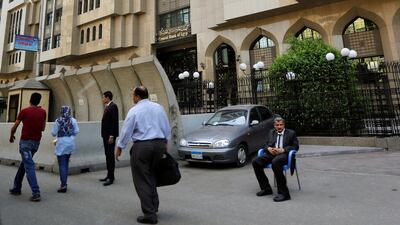Egypt’s foreign-currency reserves jumped to a record in July, as investor confidence surged since the country embarked on an IMF-backed economic programme last year.
Net international reserves rose by US$4.7 billion to $36.04bn, Bloomberg News reported, citing central bank data released on Tuesday. Egypt's reserves saw total inflows of $7.7b in July, including $3.7bn in foreign investments and $4bn from the local economy, the Cairo-based Al Mal newspaper reported, citing the central bank governor Tarek Amer. Egypt also received a $1.25bn loan instalment from the IMF in the month.
Investors have poured money into Egyptian debt and equities since authorities removed most currency restrictions and raised interest rates in November to end a dollar-shortage and secure a $12bn IMF loan. The government has also twice tapped international bond markets, raising $7bn.
"Following the liberalisation of exchange rate policy [in November], combined with other structural economic reforms implemented as part of an IMF programme, investor sentiment towards Egypt has vastly improved as the pound is no longer as overvalued as it had been under the previous regime," analysts at BMI research said. "Indeed, it is now trading far below its 20-year average real effective exchange rate."
More than $13bn has flowed into Egyptian Treasury Bills as of July 25, with yields soaring over 22 per cent. Most of those funds, however, go into the central bank’s “repatriation fund” that guarantees expedited transfer of money for foreign investors.
Reserves at North Africa's largest economy, plummeted after the 2011 uprising the against former president Hosni Mubarak triggered years of economic and political turmoil.
Although reserves have rebounded, a weaker currency coupled with cuts to fuel subsidies have helped push inflation above 30 per cent and prompted the central bank to raise interest rates by 7 percentage points since November. Egypt’s foreign debt has also risen, to $73.9bn in March from $53.4bn a year earlier.
Surging prices are pressuring Egypt’s 93 million population, half of which lives near the poverty line, as the government tries to ease the pain through boosting social programmes and cutting taxes for people on lower incomes.
Egypt may exceed the $10 billion target for foreign direct investment this year, as the weaker pound lowers the cost of doing business in North Africa’s largest economy, according to the investment minister Sahar Nasr.
Ms Nasr said she has been approached by investors from Saudi Arabia, Singapore, China and the UAE - including the Emaar Properties chairman Mohamed Alabbar, and Al Ghurair Group - about potential deals.
The pipeline for the fiscal year that began July 1 includes oil and gas, real estate, tourism and logistics investments, she said in an interview in Cairo on Monday, without commenting on deal sizes.
Egypt received about $8.7bn in foreign direct investment in the fiscal year ended June 30, Ms Nasr said, an increase from $6.9bn a year earlier.
*With Bloomberg

